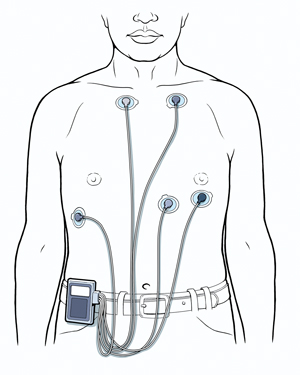A
B
C
D
E
F
G
H
I
J
K
L
M
N
O
P
Q
R
S
T
U
V
W
X
Y
Z
Topic IndexLibrary Index
Click a letter to see a list of conditions beginning with that letter.
Click 'Topic Index' to return to the index for the current topic.
Click 'Library Index' to return to the listing of all topics.
Diagnosing Syncope
Syncope is when you suddenly faint or pass out (lose consciousness). It's caused by not getting enough blood flow to the brain. Syncope can have many causes. Some of them aren't serious, but others may be life-threatening. Your healthcare provider will ask you about your fainting episode and your past health. They'll also do an exam. You may need a number of tests to assess your symptoms.
Health history and exam
You may be asked about:
-
Where and when you fainted
-
How long you weren't awake and aware (unconscious)
-
How you felt just before and right after you fainted
-
How you feel when you do moderate to heavy exercise
-
If you have a family history of heart disease or fainting
-
If you have a heart or neurological problem
-
What medicines you're taking
-
If you drink alcohol
-
If you use illegal drugs
Your healthcare provider will examine you and may:
-
Check your blood pressure while lying down, sitting, and standing
-
Listen for any heart murmurs or abnormal heartbeats
-
Listen and feel the pulses in your neck
-
Examine your eyes, reflexes, and limb movement
Tests
 |
| Holter monitor |
You may need one of more of the following tests:
-
Electrocardiogram (ECG). This test can help find a slow, fast, or irregular heartbeat.
-
Holter monitoring. You wear a portable ECG monitor for 24 to 48 hours. It records your heartbeat and looks for any problems.
-
Event monitoring. You wear a portable ECG monitor for several weeks. Like a Holter monitor, it records your heartbeat and looks for any problems.
-
Implantable loop recorder. This is a small heart monitor that's inserted over the heart under the skin. It's used for long-term heart rhythm recordings, usually up to 3 to 4 years.
-
Echocardiogram. This test takes pictures of your heart with ultrasound. It can show heart valve or heart function problems. It can also show damage from a heart attack.
-
Electrophysiology studies (EPS). These help find weak, damaged, or overactive electrical pathways that make your heart beat too fast or slow. They can find the cause of a heart rate or rhythm problem. They can also help your healthcare provider decide how to treat it.
-
Tilt table testing. This testing helps show if changes in your body position affect your heart rate and blood pressure.
-
Carotid artery ultrasound. This test shows the blood flow through the arteries in the neck that supply oxygen and circulation to your brain. It can find any blockages in these arteries.
-
MRI or CT scan of the neck and brain. These tests see if there is something else going on in the brain that is causing a loss of consciousness. They scan the blood flow and brain structures. They are done in a radiology department.
-
Blood and other lab tests. These tests are used to find any problems in your body that may cause syncope. For example, low blood sugar can cause a loss of consciousness. It may be mistaken for syncope. Other wastes and toxins, and even dehydration, can affect brain function and consciousness.
-
Electroencephalogram (EEG). If your healthcare provider thinks you may be having seizures instead of syncope, this test may be done. Electrodes are put on your scalp. They measure the activity of the brain. A neurologist who specializes in reading EEGs studies the results.
You may need to see other specialists to fully assess the cause of your syncope. For instance, you may see a cardiologist or a neurologist.. Treatment will be based on the cause of your syncope. Ask your healthcare provider how you'll get the test results and what steps must be taken.
One of the concerns with syncope is being injured if you faint. Finding a cause for syncope can help keep you safe from injury. Don't drive a car, use heavy machinery, or do activities that may result in injury if you were to faint. Ask your provider when it's safe to do these activities again.
Online Medical Reviewer:
Ronald Karlin MD
Online Medical Reviewer:
Stacey Wojcik MBA BSN RN
Online Medical Reviewer:
Steven Kang MD
Date Last Reviewed:
10/1/2023
© 2000-2024 The StayWell Company, LLC. All rights reserved. This information is not intended as a substitute for professional medical care. Always follow your healthcare professional's instructions.